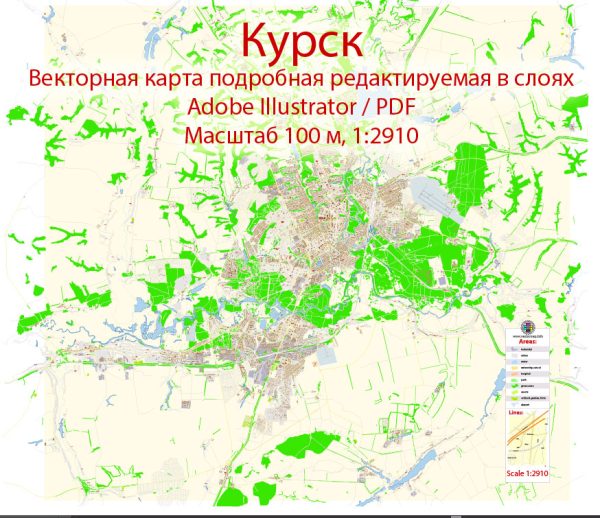A general overview of the economic and transportation aspects of Kursk, Russia.
Vectormap.Net provide you with the most accurate and up-to-date vector maps in Adobe Illustrator, PDF and other formats, designed for editing and printing. Please read the vector map descriptions carefully.
Economic Overview:
1. Industry:
- Kursk has a diverse industrial base, with sectors like metallurgy, machinery, and food processing playing a significant role.
- The city is known for its iron and steel production, with several metallurgical plants contributing to the local economy.
2. Agriculture:
- Agriculture is an essential part of the regional economy. The fertile soil in the Kursk Oblast supports the cultivation of crops like wheat, barley, and sugar beets.
3. Mining:
- Kursk is situated in a region with significant iron ore deposits. Mining activities contribute to the local economy.
4. Energy:
- The energy sector in Kursk includes both traditional and renewable sources. Power generation facilities, including thermal power plants, contribute to the regional energy supply.
5. Commerce and Services:
- Kursk serves as a regional commercial and administrative center, providing various services to the surrounding areas.
6. Investment Climate:
- The investment climate in Kursk is influenced by regional and national economic policies. The city may attract investments in sectors like industry, agriculture, and infrastructure.
Transportation Overview:
1. Railways:
- Kursk has a well-developed railway network, connecting it to other major cities in Russia. The railway station serves as a transportation hub for both passengers and freight.
2. Roadways:
- The city is connected by a network of roads and highways. The road infrastructure facilitates the movement of goods and people within the region.
3. Public Transportation:
- Kursk has a public transportation system, including buses and trams, to facilitate local commuting.
4. Air Transport:
- Kursk has an airport, Zheleznogorsk Airport (also known as Kursk Vostochny Airport), which provides domestic flights.
5. River Transport:
- The Seim River, which flows through the Kursk Oblast, historically played a role in transportation and trade. However, the significance of river transport has diminished over time.
6. Infrastructure Development:
- Infrastructure development is an ongoing process, and the government may invest in improving transportation facilities to enhance connectivity and support economic activities.
Keep in mind that for the most up-to-date and specific information, it’s advisable to consult local government sources, recent economic reports, or news articles that provide the latest insights into the economic and transportation status of Kursk, Russia.


 Author: Kirill Shrayber, Ph.D. FRGS
Author: Kirill Shrayber, Ph.D. FRGS